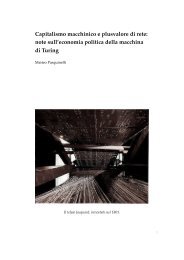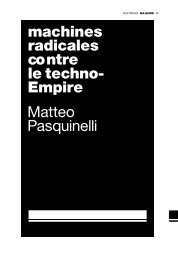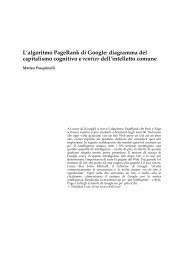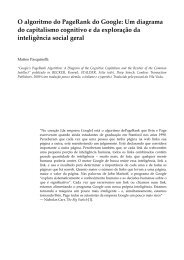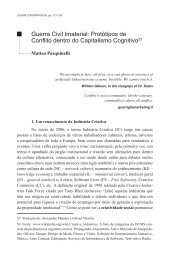However a dissemination process is never as linear and peaceful as amathematical graph might suggest. On a collective scale a cognitive productalways “fights” against other products to attain a natural leadership. Thedestiny of an idea is always hegemonic, even in the “cooperation betweenbrains” and in the digital domain of free multiplication. The naturalenvironment of ideas is similar to the state of nature in Hobbes. The mottoHomo homini lupus [the man is a wolf to man] could be applied to media,brands, signs and any kind of “semiotic machines” of the knowledgeeconomy. It is an immaterial but not often silent “war of all ideas against allideas.” If Lazzarato and Tarde track back the collective making of value, sucha competitive nature is more transparent reading Enzo Rullani.4. Enzo Rullani and the “law of diffusion”Rullani was among the first to introduce the term cognitive capitalism 8 . Unlikemost, he does not point out the process of knowledge sharing, but above allthe process of cognitive valorisation. He is quite clear about the fact thatcompetition still exists (is perhaps even stronger) in the realm of “immaterial”economy. Rullani is one of few people that try to measure how much valueknowledge produces and as a seasoned economist he gives mathematicalformulas as well - like in his book Economia della conoscenza [Economy ofKnowledge] 9 . Rullani says that the value of knowledge is multiplied by itsdiffusion, and that you have to learn how to manage this kind of circulation.As Rullani puts it, in the interview with Antonella Corsani published onMultitudes in 2000 10 :An economy based on knowledge is structurally anchored to sharing:knowledge produces value if it is adopted, and the adoption (in that format andthe consequent standards) makes interdependency.The value of immaterial objects is produced by dissemination andinterdependency: there is the same process behind the popularity of a pop starand behind the success of a software. The digital revolution made thereproduction of immaterial objects easier, faster, ubiquitous and almost free.However, as Rullani points out, “proprietary logic does not disappear but hasto subordinate itself to the law of diffusion” 11 : proprietary logic is no longer basedon space and objects, but on time and speed.6
There are three ways that a producer of knowledge can distribute its uses, stillkeeping a part of the advantage under the form of: 1) a speed differential inthe production of new knowledge or in the exploitation of its uses; 2) a controlof the context stronger than others; 3) a network of alliances and cooperationcapable of contracting and controlling modalities of usage of knowledgewithin the whole circuit of sharing.A speed differential means: “I got this idea and I can handle it better thanothers: while they are still becoming familiar with it, I develop it further”. Abetter understanding of the context is something not easy to duplicate: it isabout the genealogy of the idea, the cultural and social history of a place, theconfidential information accumulated in years. The network of alliances iscalled sometimes “social capital” and is implemented as “social networks” onthe web: it is about your contacts, your PR, your street and web credibility.Here it is clear that a given idea produces value in a dynamicenvironment challenged by other forces and other products. Any idea lives ina jungle – in a constant guerrilla warfare – and cognitive workers follow oftenthe destiny of their brainchildren. In the capitalism of digital networks time isa more and more crucial dimension: a time advantage is measured in seconds.Moreover, in the society of white noise the rarest commodity is attention. Aneconomy of scarcity exists even in the cognitive capitalism as a scarcity ofattention and related attention economy. When everything can be duplicatedeverywhere, time becomes more important than space.An example of the competition advantage in the digital domain is theWired CD included with the November 2004 issue under the CreativeCommons licences. Music tracks were donated by Beastie Boys, David Byrne,Gilberto Gil, etc. for free copying, sharing and sampling (see:www.creativecommons.org/wired). The neoliberal agenda of Wired magazineprovides the clear coordinates for understanding that operation. Indeed, thereare more examples of musicians and brain workers that associate their activitywith copyleft, Creative Commons or file sharing on P2P networks. We onlyheard about the first runners, as it is no longer a novelty for those who camesecond. Anyway, there never is a total adherence to the Creative Commonscrusade, it is always a hybrid strategy: I release part of my work as open andfree to gain visibility and credibility, but not the whole work. Another strategyis that you can copy and distribute all this content, but not now, only in fourmonths. And there are also people complaining about Creative Commons andFree Software being hijacked by corporations and majors - the point is that theworld out there is full of bad music which is free to copy and distribute. Noscandal, we have always suspected it was a race.Rullani shows how competition is still present in the knowledgeeconomy, even in the parallel enclave of digital commons. Competition is afield radical thought never attempted to enter: because it is not politicallycorrect to admit such a competition and because any political solution iscontroversial. It is impossible to reconstruct any unified political subject (as atthe times of proletariat) starting from such a balkanised scenario of “socialfactories” and molecular biopolitical production. However, if individualsurplus-value is difficult to measure and reclaim, the collective accumulationis still something visible and tangible.7



